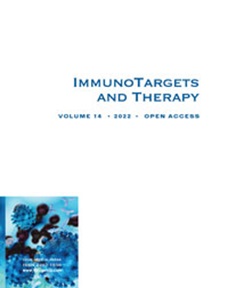CD69 是一种前景看好的癌症免疫疗法和预后预测靶点
IF 4.4
Q1 IMMUNOLOGY
引用次数: 0
摘要
摘要 利用T细胞攻击肿瘤的免疫疗法是一种很有前景的治疗策略,但免疫抑制性T细胞亚群(如调节性T细胞(Treg))和免疫检查点分子(包括程序性死亡-1(PD-1))会抑制T细胞免疫反应的强度,从而影响肿瘤的清除。分化簇 69(CD69)被称为早期白细胞活化标志物,可作为 T 细胞活化的测量指标或早期标志物。近年来,CD69在调节Treg/Th17(T辅助细胞17)分化和T细胞组织滞留方面的功能引起了人们的极大兴趣。这些功能与 CD69 在肿瘤环境(TME)中的免疫抑制作用有关。在这篇综述中,我们首先总结了目前有关 CD69 生物功能的观点,并证明 CD69 是 T 细胞活化、分化、保留和衰竭的调节因子。然后,我们讨论了对 CD69 缺乏和抗 CD69 抗体应用的最新理解进展,并阐明了靶向 CD69 在癌症免疫疗法和预后预测中的价值。本文章由计算机程序翻译,如有差异,请以英文原文为准。
CD69 is a Promising Immunotherapy and Prognosis Prediction Target in Cancer
Abstract Immunotherapy utilizing T cells that attack tumors is a promising strategy for treatment, but immune suppressive T cell subsets, such as regulatory T cell (Treg), and immune checkpoint molecules, including programmed death-1 (PD-1), can suppress the intensity of a T cell immune reaction and thereby impair tumor clearance. Cluster of differentiation 69 (CD69), known as an early leukocyte activation marker, can be used as a measure or early marker of T cell activation. In recent years, the functions of CD69 in the regulation of Treg/Th17 (T helper cell 17) differentiation and in the tissue retention of T cells have attracted considerable interest. These functions are related to the role of CD69 in immune suppression in tumor environments (TME). In this review, we first summarized current perspectives in the biological function of CD69 and demonstrated that CD69 acts as a regulator of T cell activation, differentiation, retention, and exhaustion. Then, we discussed recent advances in understanding of CD69 deficiency and anti-CD69 antibody administration and shed light on the value of targeting on CD69 for cancer immunotherapy and prognosis prediction.
求助全文
通过发布文献求助,成功后即可免费获取论文全文。
去求助
来源期刊

ImmunoTargets and Therapy
IMMUNOLOGY-
CiteScore
16.50
自引率
0.00%
发文量
7
审稿时长
16 weeks
期刊介绍:
Immuno Targets and Therapy is an international, peer-reviewed open access journal focusing on the immunological basis of diseases, potential targets for immune based therapy and treatment protocols employed to improve patient management. Basic immunology and physiology of the immune system in health, and disease will be also covered.In addition, the journal will focus on the impact of management programs and new therapeutic agents and protocols on patient perspectives such as quality of life, adherence and satisfaction.
 求助内容:
求助内容: 应助结果提醒方式:
应助结果提醒方式:


